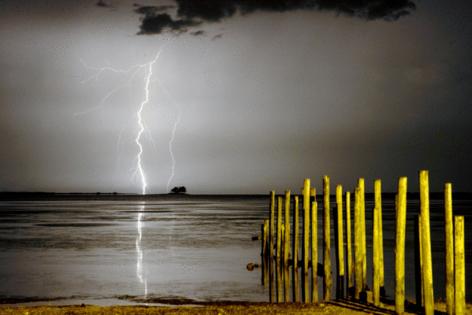Do storms scare your dog? A new drug could help
Published in Cats & Dogs News
TAMPA, Fla. -- The first time Tammy freaked out, her human had no idea what was happening.
It was summer, two years ago, afternoon sun streaming through the windows of the dog’s Port Charlotte home.
Suddenly, the happy, waggy Basset Hound started whining, drooling, shaking. She paced around her owner, Jill Powers. She wouldn’t leave her side.
A half-hour later, as the sky darkened and thunder began booming, the dog’s eyes grew huge and desperate. She couldn’t stop trembling.
Powers tried distracting her with treats, taking her into a closet, hugging and soothing her. “You’re alright, Tammy, girl. It’s OK.”
Powers was sure her dog was having a heart attack. She didn’t associate Tammy’s reaction with thunder. She’d had dogs all her life; none had been scared by storms.
But when thunder rumbled in a few weeks later and sent Tammy, quivering, to curl in a corner, Powers realized what was triggering her. She could sense the storms.
Powers, 67, had rescued the 5-year-old dog after its owner moved into assisted living. She didn’t know Tammy’s history, only that she was barking her awake during night storms and inconsolable for hours afterwards.
Powers watched weather reports, canceled dinner plans with friends, postponed birthday celebrations, even left Buffalo Bills watch parties early, too sad to think of Tammy alone and suffering.
She ordered amino acids to calm Tammy, melatonin to chill her out, homeopathic pills someone at the flea market said help people with stage fright. The ThunderShirt she bought made Tammy even more terrified.
And the problem with all of those is you have to act before the storm starts. In Florida, in summer, you never know.
• • •
Last spring, Powers saw an ad on social media: Does your dog suffer from storm anxiety?
She learned about a Dog Storm Study, a clinical trial for a new medication that is supposed to calm dogs who are afraid of thunder.
Why not? Powers asked herself. What do I have to lose?
The U.S. Food and Drug Administration won’t disclose the sponsor, but the pharmaceutical company is looking for 250 dogs who have thunderphobia. The study is taking place in 13 veterinary clinics across Florida, and at others in Louisiana, Missouri, even Australia.
Dogs have to be healthy, not breeding, and weigh at least nine pounds. For three months, people give their pets a pill twice a day. Dosage isn’t tied to storms, so effects should work any time, even when owners aren’t there. Half of the pets get placebos, the rest get the experimental drug. People have to log their dogs’ responses to storms and take them to the vet up to four times.
Everything is free.
The study is accepting new dogs until the end of August.
• • •
Almost half of dogs fear loud noises, especially fireworks and thunder. And Florida has more severe storms than any other state — about 80 a year.
Even dogs that aren’t usually anxious can suffer during thunderstorms, said veterinarian Erin Cantwell. “The noise, rattling windows, barometric pressure affects them,” she said. Vibrations above, below, all around them. “Some dogs can actually smell changes in the air.”
It’s instinctual, she said, for them to seek shelter during storms. “They’re just looking for a quiet place to escape.” But for many, the fear becomes overwhelming, even dangerous.
In the Nokomis clinic where she works, Brandt Veterinary, Cantwell has treated a dog who broke his teeth trying to escape his crate during a storm, one who hurled herself through a window, another who chewed sores into her legs.
She knows how helpless owners feel while their dogs are suffering. Morgan, a Lab mix she had during vet school, hid under tables during thunderstorms, tore holes in the carpet, gnawed through the bedroom door.
She has watched dogs’ agony increase over time — and seen symptoms not show up until old age.
“All we can do now is give them trazodone two hours before a storm and try to comfort them,” Cantwell said. Anti-anxiety medications seem to soothe some dogs. A vet friend, she said, tried CBD, but couldn’t discern a difference in her pet’s reactions.
When owners ask Cantwell how to help their frightened dogs, she suggests taking them into a room without windows, putting blankets in a closet, distracting them with treats and food puzzles, playing music or some sort of white noise.
Her clinic is one of the study’s investigation sites. Last summer, she enrolled 30 dogs. This year, she hopes to surpass that. She has seen dogs from age 1 to 14, from tiny terriers to big basset hounds, including Tammy.
• • •
Did the pills help Tammy? Powers isn’t technically allowed to say per the rules of the study. She doesn’t even know if Tammy got the medication or a placebo.
All she can say is this: Since Tammy finished the study last summer, Powers hasn’t been able to give her any pills this storm season. And Tammy isn’t happy.
A few weeks ago, as thunder roiled outside her living room windows, Powers filmed her Basset Hound turning circles, whimpering and quaking.
“It’s OK. It’s alright,” Powers kept saying.
She hopes the pharmaceutical company gets the data it needs quickly. She hopes the pills get approved. She hopes she can buy the medicine next summer.
She hopes Tammy goes back to her happy, waggy self, trotting around with her stuffed bunny in her mouth, even during storms.
A remedy would mean so much less anxiety — not just for Tammy, but for everyone.
©2025 Tampa Bay Times. Visit at tampabay.com. Distributed by Tribune Content Agency, LLC.









Comments